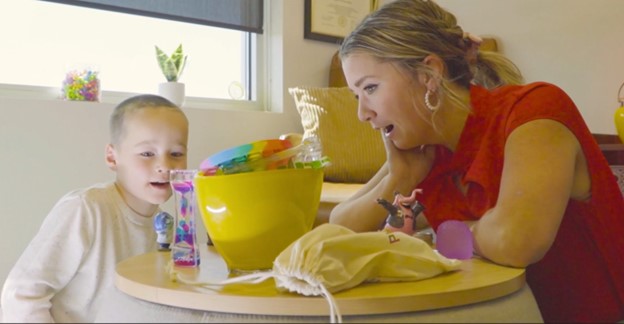What Is Play Therapy And Why It Matters for Kids
“Play Therapy is based upon the fact that play is the child’s natural medium of self expression…It is an opportunity which is given to the child to ‘play out’ his feelings and problems just as in certain types of adult therapy an individual ‘talks out’ his difficulties.” -Virginia Axline

What Is Play Therapy And Why It Matters for Kids
When a child is overwhelmed, anxious, or struggling to express how they feel, words aren’t always enough. In fact, for many children, talking about big emotions or difficult experiences can feel nearly impossible. That’s where play therapy comes in. It is an evidence-based, developmentally appropriate approach that helps kids communicate and heal through play.
What Is Play Therapy?
Play therapy is a form of therapy that uses the natural language of children, play, to explore thoughts, emotions, and behaviors. Instead of relying on verbal explanations alone, children are given toys, art supplies, puppets, sand trays, games, and other expressive tools to “play out” what’s on their minds. A trained play therapist observes and interacts with the child in a way that supports emotional processing and insight.
The process isn’t just “playing”, it’s purposeful, structured, and guided by clinical theory. Play therapists use a variety of theories (e.g., Child-Centered Play Therapy, Cognitive-Behavioral Play Therapy, Adlerian Play Therapy, etc) and other interventions depending on the child’s needs and the therapeutic goals.
Why Play Works
Children often don’t have the vocabulary, or emotional insight, to explore complex topics such as fear, loss, trauma, or stress. But through play, they play out what they’ve experienced or how they feel. This helps them externalize internal struggles, test out solutions, and gain a sense of mastery in a safe and supportive environment.
In short, play offers a window into a child’s inner world and play therapy turns that window into a path toward healing.
Who Can Benefit from Play Therapy?
Play therapy is typically used with children age 3 years old through early adolescence, but can be used through adulthood. It’s used to support a wide range of emotional and behavioral challenges, including:
- Anxiety and depression
- Grief and loss
- Trauma and abuse
- Family transitions (e.g., divorce, adoption, moves)
- Social difficulties
- ADHD or impulse control challenges
- Attachment disruptions
It’s also effective for children who are adjusting to medical diagnoses or dealing with stress related to school or peer relationships.
What Does a Session Look Like?
Play therapy sessions typically last 30–60 minutes, depending on the child’s age and developmental level, as well as parent involvement. In a session, the child may engage in open-ended play, choose specific toys, or be guided through structured activities that reflect their challenges. The therapist tracks themes, offers reflection, and gently supports the child in developing emotional awareness, coping skills, and resilience.
While much of the therapy happens through the child’s play, caregivers are also a key part of the process. Therapists often provide feedback, parenting support, or family sessions to reinforce progress at home.
Final Thoughts
Play therapy is more than play, it’s a powerful, evidenced-based way for children to feel seen, heard, and supported on their journey toward emotional well-being. If your child is struggling and having a hard time putting their feelings into words, play therapy may be the bridge they need. At 515 Therapy and Consulting, we have therapists trained in play therapy available to support the needs of your child. Call (515) 401-1010, text (515) 203-3236 or send a message by going here today to get started!


